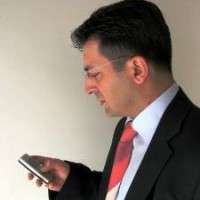Research to link mobile phones and health

A Murdoch University PhD candidate envisions a future in which everyone wears a low-energy sensor to monitor their health – and he's doing the computing work to make it a reality.
James Meneghello of Murdoch's School of Information Technology recently returned from three months with DistriNet Research Group at the University of Leuven (KU Leuven) in Belgium working on leading-edge wireless sensor networking.
He said the time in Belgium built on his research into 'collaborative mobile processing'.
"A lot has been done on using sensors to monitor health, but my work is the first that uses mobile phones collaboratively to detect and alert people to physical conditions like heart attacks," Mr Meneghello said.
"The challenge from the IT perspective is to gather enough processing power to interpret electrocardiography (ECG) data, which is where the idea of having multiple phones connect and collaborate in real time comes in.
"Basically if a person wearing a sensor has a problem with their heart, I want their phone to detect the anomaly and reach out to phones around it, using them to process the information, then pulling it back to warn the person that they're about to have a heart attack."
Mr Meneghello said he was motivated by the fact that studies have shown recognising and treating a heart attack within one to two hours cuts the death rate by half.
But he said heart health was only one facet of the technology's potential.
"Part of my PhD will focus on Aboriginal health in remote and very remote areas. We're looking at applying low-energy sensors to individuals with Type-2 Diabetes," Mr Meneghello said.
"One of the dangers for people with the condition is the potential for Diabetic Neuropathy, which can lead to nerve damage and sometimes amputation.
"Using this technology, we can theoretically tell if Diabetic Neuropathy is occurring by monitoring variations in heart rate. We're hoping in these communities, we can monitor a person's health through their mobile phone and collect the data monthly with an aerial flyover.
"If the technology works, not only could this reduce physical pain, it could save a person having to travel up to 800 kilometres round trip to regularly see a doctor."
Mr Meneghello said collaborative processing stood to be very valuable in places with little to no access to a network, such as remote areas and underground mine sites.
Provided by Murdoch University



















